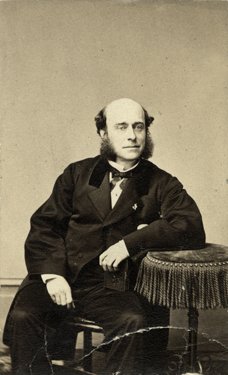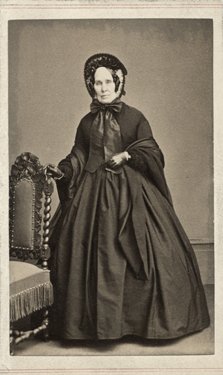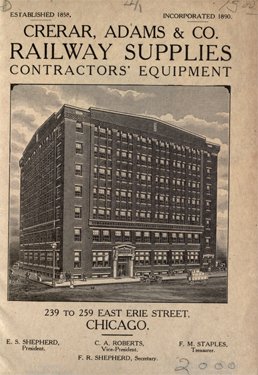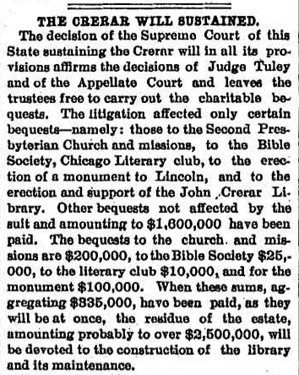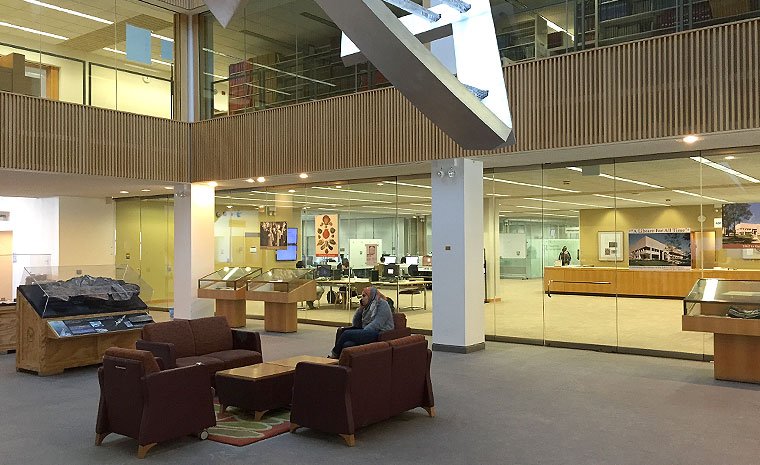The Founding of the Library
John Crerar was born on March 8, 1827, in New York City of Scottish immigrants, John Crerar and Agnes Smeallie. His father died in New York on July 23, 1827, leaving two children, an older brother, Peter Crerar (1821-1883) and the infant John Crerar. Agnes Crerar then married John Boyd, the head of the New York branch of a British iron and steel company. Crerar's early career was as a bookkeeper in his step-father's firm, but he later joined a rival firm in New York. In 1856, Crerar went to work for Morris K. Jesup, owner of a railway supply business.
Crerar came to Chicago in 1862 as Jesup's partner to inspect one of their branch offices, a large manufacturing and distributing plant for railroad supplies founded by J. McGregor Adams. So impressed with the future possibilities of Adams' business and Chicago itself Crerar purchased Jesup's interest, becoming president of the new firm Crerar, Adams & Company. During this period Chicago was becoming a major railway center and a distribution point for railroad supplies. Financial success was immediate and by 1868 Crerar was a leading businessman, financing new railways and involving himself in companies like the Chicago and Alton Railroad Company, the Chicago & Joliet Railroad, the Illinois Trust and Savings Bank, and the London, Liverpool and Globe Insurance Company. He served as director of all these organizations and president of some at one time or another. Crerar was one of the incorporators of the Pullman Palace Car Company and served on its' Board of Directors throughout his life. Crerar became one of Chicago's leading citizens, lending his influence and resources to causes he considered beneficial to the development of Chicago. Following the 1871 fire, as Director of the Chicago Relief and Aid Society, he was selected by the New York Chamber of Commerce to distribute the funds which they sent. Active in the Commercial Club which founded the Chicago Manual Training School, later to become part of the University of Chicago High School, Crerar also belonged to the Chicago Literary Club, the Chicago Historical Society, the YMCA, the American Sunday School Union, the Chicago Orphan Asylum, and the Presbyterian Hospital, holding positions of director or president in each.
Crerar maintained a lifelong interest in books and learning and was an active member and former president of the New York Mercantile Library, and was instrumental in bringing William Makepeace Thackeray to America on his famous lecture tour of 1852.
Known for leading a quiet personal life, Crerar never married and made his residence at the Grand Pacific Hotel. He was a fervent ecclesiastic and active protagonist of orthodoxy. In 1886 while still in good health, Crerar wrote his will bequeathing large sums of money to friends, cousins on his mother's side, philanthropies, and for the erection of a statue of Abraham Lincoln. All monies left over were to be used for the founding of a free public library.
"I give, devise, and bequeath and all the rest, remainder and residue of my estate both real and personal for the erection, creation, maintenance and endowment of a Free Public Library to be called The John Crerar Library and to be located in the city of Chicago, Illinois, a preference being given to the South Division of the city inasmuch as the Newberry Library will be located in the North Division...I desire the building to be tasteful, substantial and fireproof and that a sufficient fund to be reserved over and above the cost of its construction to provide, maintain, and support a library for all time. I desire that the books and periodicals be selected with a view to create and sustain a healthy moral and Christian sentiment in the community and that all nastiness and immorality be excluded. I do not mean by this that there shall be nothing but hymn books and sermons, but I mean that dirty French novels and all skeptical trash and works of questionable moral tone shall never be found in this library. I want its atmosphere that of Christian refinement, and its aim and object the building up of character, and I rest content that the friends I have named will carry out my wishes in those particulars."
— from the will of John Crerar
John Crerar died in Chicago on October 19, 1889 and was buried in Brooklyn next to his mother. The Chicago Central Music Hall could not accommodate all who wished to attend his memorial service.
The will was disputed by relatives of the senior John Crerar, and a protracted legal battle followed. After a defeat in the Circuit Court, the disputants appealed to the Illinois Supreme Court in Ottawa, Illinois. There, on 19 June 1893, the will was sustained in all its provisions. Crerar's biographer Thomas W. Goodspeed writes of the will that "It was not made in any immediate expectation of death. It was not the hurried work of the sick bed, but the well-considered, fully matured work of a man little past middle age, in the full vigour of health, with the possibility of many years of active life still before him...it was evidently the result of long reflection and final, deliberate, purpose."
A board of directors for the library was established to guide the planning process. After gathering input from a large number of eminent industrialists, academics and librarians, and in order to complement other major Chicago libraries, namely the Newberry Library which was formed in 1887 and the Chicago Public Library which opened in 1873, the directors decided to limit the collections to the sciences. Collections in medicine, formerly handled by the Newberry Library, were added to the library's scope in 1906.
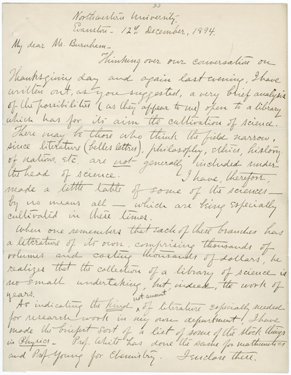
Records of the John Crerar Library, Box 14, Folder 3, Special Collections Research Center, University of Chicago Library
The board of directors sought opinions from eminent academics, prominent businessmen, and senior administrators of leading libraries in other cities. Crew was the Fayerweather Professor of Physics at Northwestern University, 1892-1930 and Blackstone, president of the Chicago and Alton Railroad from 1864 to 1899, also named as a director in the will of John Crerar. Crew includes lists of core types of library materials for physics, as well as lists for mathematics and chemistry compiled by Prof. White and Prof. Young. The former is likely Henry Seeley White who joined Northwestern University's mathematics faculty around 1893, and the latter Abraham Van Eps Young who was head of Northwestern's chemistry faculty for more than thirty years.
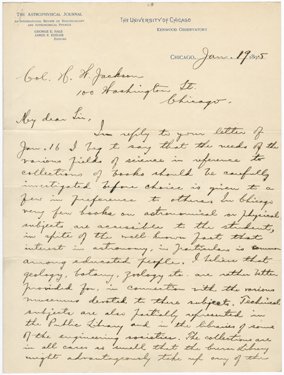
Records of the John Crerar Library, Box 14, Folder 3, Special Collections Research Center, University of Chicago Library.
Hale served as full professor at the University of Chicago, 1897-1905, as well as editor of The Astrophysical Journal from 1895. Not surprisingly Hale recommended purchasing books in astronomy, as well as "publications of various societies and academies of science" which would contain papers in all branches of science.
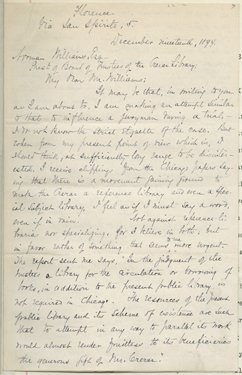
Records of the John Crerar Library, Box 14, Folder 3, Special Collections Research Center, University of Chicago Library.
Plummer was director of the Pratt Institute Free Library of Brooklyn, and held various leadership positions in the American Library Association. In contrast to many who advocated a non-circulating science and technical library, Plummer makes an impassioned plea for "a library for the making of readers and scholars" and suggests services such as admitting children as members, holding lectures on literary subjects, and creating "a periodical dealing with everything concerning books and reading."
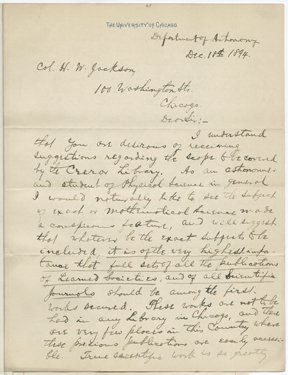
Records of the John Crerar Library, Box 14, Folder 3, Special Collections Research Center, University of Chicago Library.
See was an instructor at the University of Chicago (under George E. Hale) after obtaining a Ph.D. from the University of Berlin in 1892. Despite a promising early career, See failed to receive a promotion at the University of Chicago and left in 1896. See supported the idea of a science reference library and wrote "it is of the very highest importance that full sets of all the publications of the learned societies and all scientific journals should be among the first works secured" further pointing out that few libraries in the United States at that time had complete collections of these works.
